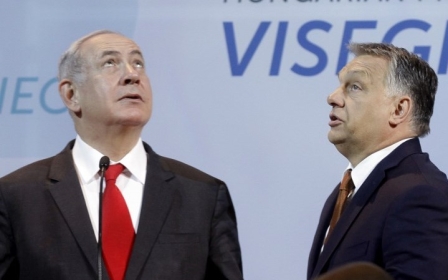I am on trial in Germany for peacefully protesting Israeli apartheid

I am in the midst of a nightmare because I dared to call for equality, justice, freedom and dignity for Palestinians. My activism in Germany as part of the international boycott, divestment and sanctions (BDS) movement has landed me before the court.
Last month, charges were levied against me and my two Jewish comrades, Ronnie Barkan and Stavit Sinai. Together, we are known as the #humboldt3, because we peacefully protested a talk at Humboldt University in Berlin by Knesset member Aliza Lavie, who supported Israel’s 2014 war on the besieged Gaza Strip.
I have been deeply touched by the international support we have received throughout this ordeal. However, we still need all human rights defenders and friends of Palestine to stand with us, since we are going through a re-trial following Israeli pressure to convict us.
Many have told me that I will overcome - but what they might not know is that as a three-decade survivor of the Israeli occupation, the experience of violence, oppression and collective punishment has taught me to keep fighting for life.
In the courtroom, sitting as a criminal, I gave the following statement.
Stay informed with MEE's newsletters
Sign up to get the latest alerts, insights and analysis, starting with Turkey Unpacked
Shared humanity
I am standing here on trial as a criminal defendant, along with my comrades, as a result of us daring to speak up publicly against Israel’s crimes against humanity in my beloved Palestine. It came out of my responsibility as a humanist, and as a Palestinian, to respond to Aliza Lavie, who was in the coalition that decided to slaughter, displace, bombard, torture, imprison and obliterate my beloved people in 2014.
It was my moral duty to call her out for her crimes against humanity. Throughout the event, I was silent, only listening in pain as Lavie spoke. I saw her speaking with joy about her so-called democratic country - but in reality, she was rejoicing at the blood of my people, without any shame.
There was one image that I saw in my mind and felt in my heart: that of my friends who lost their limbs while protesting peacefully
There was one image that I saw in my mind and felt in my heart: that of my friends who lost their limbs while protesting peacefully for justice and freedom inside the Gaza ghetto.
I thought of all my family and friends living a brutal, horrific life under Israeli apartheid, imprisoned and illegally collectively punished.
I saw tens of thousands of homes destroyed in Israeli massacres. Hundreds of thousands of Palestinians have been rendered homeless as a result of the 2014 Gaza massacre and other Israeli onslaughts.
Your honour, if you were in my place - and you will not be, because you will never understand the feeling of waiting for a bomb to fall on your family’s or your neighbour’s home - you would understand how hard it is to live in this continuous horror.
Collective duty
I was shot in the leg with a live bullet while protesting peacefully - planting olive trees - at the Gaza fence in 2014. Lavie, who has been in the Knesset since 2013, is among those who bear responsibility for the bullet that disabled me for months, and damaged me for a lifetime.
Our actions at Humboldt University should be honoured, as it is the moral duty of every humanist to speak up against criminals, especially those complicit in crimes against humanity. As activists for human rights, this is our collective duty - not only in Israel, but also in Europe and specifically Germany, where we live.
We, human rights advocates, think it is our duty collectively to confront any criminal, not only in Israel, but also in Europe.
We, the Palestinians and Jews who escaped apartheid in Israel, are here in Germany to fulfill our civil and moral duty to fight for transnational solidarity, equality and justice - to rally all communities together around our shared humanity.
I came to live in Germany as a citizen of this world, hoping that I would no longer suffer under the confinement of Israeli apartheid. But I have discovered that Israeli apartheid is spreading to Germany.
Fear of speaking out
The thousands of Muslims and Palestinians in Germany do not feel safe to speak up. They feel they could be persecuted at any time, simply for shouting “Free Palestine” or dreaming to return freely to their homes, in accordance with the UN-mandated right of return. They fear persecution for calling for equality, dignity, freedom and justice in Gaza.
It is my civil duty to speak up for my Palestinian community
Your honour, for days, I was unable to sleep after encountering the fabrication of us being criminals for speaking up against Israeli apartheid. Yet I realise it is my duty as a future citizen of this country to change the discourse in Germany around Israel’s crimes.
It is my civil duty to speak up for my Palestinian community and for the implementation of international law in our land - and for our freedom to express ourselves and to protest in Germany.
I am standing in front of you today to demand justice, not only for myself and my comrades, but for all those pursuing justice and equality in Germany and Palestine.
The above statement has been edited for length and clarity.
The views expressed in this article belong to the author and do not necessarily reflect the editorial policy of Middle East Eye.
Middle East Eye delivers independent and unrivalled coverage and analysis of the Middle East, North Africa and beyond. To learn more about republishing this content and the associated fees, please fill out this form. More about MEE can be found here.






